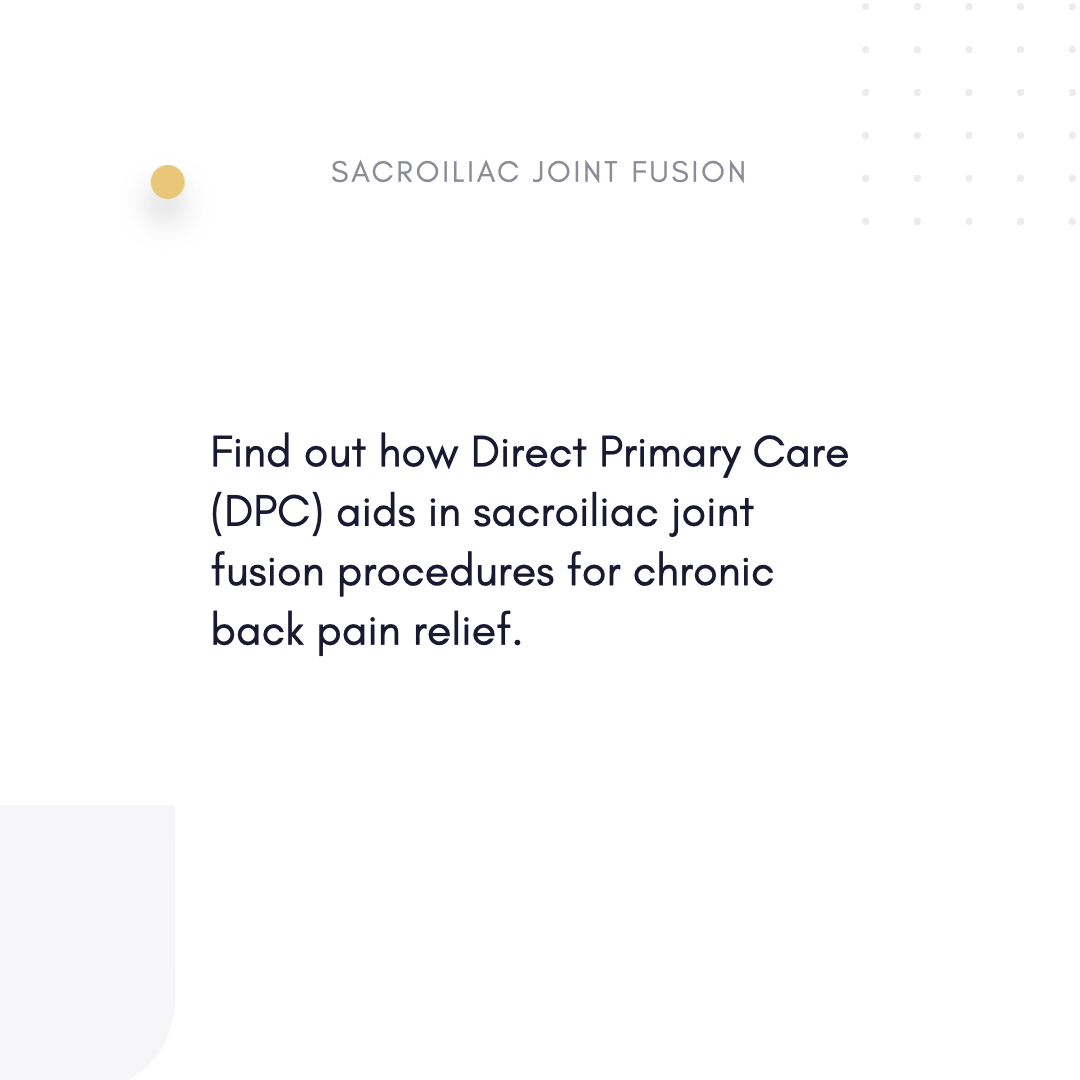Sacroiliac Joint Fusion and Direct Primary Care (DPC): Stability, Support, Renewed Mobility
Fusion can stabilize the SI joint if it hurts and makes it hard for you to move. DPC makes sure that your procedure is planned, affordable, and tailored to your recovery.

SI Joint Fusion: How It Can Help Your Lower Back Pain
Using implants, SI joint fusion makes the sacroiliac joint more stable. Important information:
- Uses: Treats problems caused by arthritis, an injury, or pregnancy.
- Methods: titanium rods that are minimally invasive (lateral or posterior).
- Safety: 70–80% less pain; risks include getting an infection or irritating a nerve.
Important points:
- Costs: DPC memberships (100–350 USD/month) include imaging before and after surgery, while traditional fees (15,000–30,000 USD/surgery) do not.
Risks of untreated SI dysfunction include:
- Chronic pain, gait abnormalities, and opioid dependence.
How DPC Improves the Results of SI Fusion
Direct Primary Care (DPC) changes pelvic care by putting patients first and coordinating care ahead of time.
Comprehensive Before Surgery Get ready
- Quick tests: Set up an MRI or diagnostic injections within a week.
- Prehab programs: Work on your core and glutes to help you heal after surgery.
- Managing medications: Before the procedure, lower the dose of opioids or NSAIDs.
Clear prices and full support
- Care that includes everything: Membership includes getting referrals to surgeons, coordinating physical therapy, and managing pain.
- Savings on costs: Self-pay DPC rates can help you save 25% to 45% on facility fees.
- Focus on mental health: Treat depression and anxiety that are caused by long-term pain.
Personalized Recovery and Long-Term Stability
- Access 24 hours a day, 7 days a week: Take care of pain or numbness right away.
- Virtual PT: Use telehealth to show people how to do their first mobility exercises.
- Preventive care: Suggest making ergonomic changes to avoid getting hurt again.
Benefits of DPC for Patients with SI Fusion
- No waiting times: 90% of DPC patients have surgery within two weeks, compared to the usual eight weeks.
- Continuity: One team is in charge of long-term medication, wound care, and physical therapy.
- No extra costs: Clear prices (for example, 12,000 USD for a minimally invasive fusion).
Success Stories from Real Life
- Case 1: Maria, 38, has postpartum SI instability. Maria's DPC team did a fusion, and she was able to walk without pain again in six weeks.
- Case 2: Tom, 55, has degenerative SI arthritis. Tom's DPC provider set up the fusion, which brought his pain down from 8/10 to 2/10.
Questions and Answers: Fusion of SI in DPC
- Q: How long until I can sit down?
- A: You can start sitting gradually after 2 to 4 weeks, but you should avoid long periods of sitting for 6 weeks.
- Q: Will metal detectors go off when they see hardware?
- A: Titanium implants are safe to use at airports, and DPC gives out implant cards.
- Q: Is it possible for fusion to fail?
- A: There is less than a 5% chance of this happening. DPC checks with X-rays at 6 and 12 weeks.
- Q: What if the pain doesn't go away?
- A: DPC looks into RF ablation, nerve blocks, or revision surgery.
What Makes DPC Great for Pelvic Care
The International Society for the Advancement of Spine Surgery (ISASS) stresses the importance of multidisciplinary care for SI. DPC gets things done by:
- Lessening problems: Prehab lowers the rate of reoperations by 30%.
- Increasing mobility: 80% of DPC patients are able to drive again within three weeks.
- Members save between 5,000 USD and 15,000 USD by using bundled pricing.
Final Thoughts
When you have SI joint fusion in DPC, it's not just about screws and rods. It's also about working with a team that cares about your pelvic stability and overall health. With DPC, you can skip the wait for a referral, see the best surgeons, and get a recovery plan that fits your life. From getting ready for surgery to pain-free steps, you can count on care that is as strong as your new foundation.






